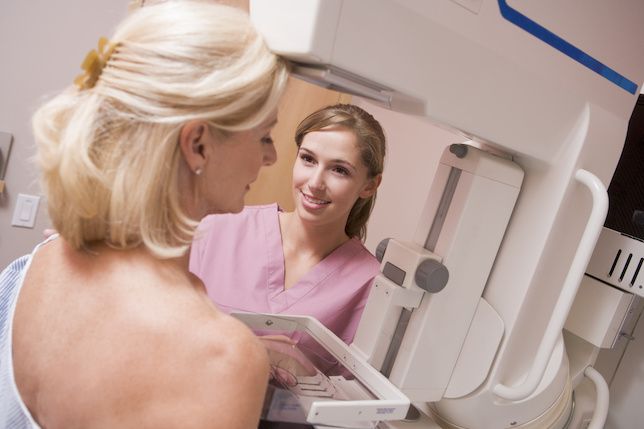
The coronavirus disease 2019 (COVID-19) pandemic caused regular cancer screenings to decrease in the United States, with many elective procedures being put on hold to conserve medical resources and help prevent the spread of the virus.1 Fear of contracting COVID-19 in health care settings also dissuaded many patients from pursuing screenings.2
As the number of patients being screened for cancer declined, health experts also saw a steep drop in cancer diagnoses in the United States between the start of the pandemic in March 2020 and June 2020.2,3
Norman E. “Ned” Sharpless, director of the National Cancer Institute, has cautioned that continuing to postpone oncology care could ultimately result in trading COVID-19 for other health crises. He wrote in Science that future incidences of cancer being discovered at later stages and with worse prognoses predicted in the coming years.2
In the Netherlands, however, investigators have found that a lapse in mammography screening for breast cancer during the pandemic has not led to diagnoses at more advanced disease states.3 Studies are being conducted on how the decrease in cancer screenings may affect health care in the future.3
In an effort to discover new incidences of breast cancer as early as possible, oncology experts are recommending that patients schedule overdue mammography screenings, as restrictions begin to lift nationwide. The American Cancer Society (ACS) is urging patients who are not exhibiting signs and symptoms of cancer to return to regular screenings as soon as it is safe to do so. Individuals who do show signs or symptoms of cancer, and those with additional factors that place them in high-risk groups, should immediately consult a health care provider for screening guidance.1
According to the ACS, a patient’s decision to be screened for cancer depends on a variety of factors. These include their risk of getting a certain type of cancer, the amount of time since their last screening for that cancer, the prevalence of COVID-19 in their community, their age, and their overall health.
The ACS and the US Preventive Services Task Force (USPSTF), as well as other medical organizations cited by the CDC, suggest that women be given the option to begin screening mammographies as early as 40 years of age.4-6 Women should start annual screenings for breast cancer by 45 years of age, the ACS recommends,4 whereas other organizations including the USPSTF and American College of Radiology recommend they begin at age 50.5-6
According to the USPSTF, although screening mammography in women aged 40 to 49 years may reduce the risk for breast cancer death, the number of averted deaths is smaller than that in older women. Further, the number of false-positive results and unnecessary biopsies is higher than that in older women. As women age from early to late 40s, the balance of benefits and harms is likely to improve.
Beginning mammography screening and having it done more frequently may also increase the risk for overdiagnosis and subsequent overtreatment.5 The ACS recommends annual mammogram screening at least through age 54 for women of average risk. Starting at age 55, women can choose to continue to be screened annually for breast cancer or choose biannual screening by mammography, according to ACS guidelines. Screening should continue after 54 years of age as long as a woman remains in good health with a life expectancy of at least 10 more years.4
According to the USPSTF, study evidence is insufficient to assess the balance of benefits and harms of screening mammography in women 75 years and older.5 The organization is in the process of updating the current recommendations for breast cancer screening, which were released in 2016.5
For women with higher risk factors, such as a family history or genetic tendency, the ACS recommends additional screening with MRIs.4 According to the CDC, because breast MRIs may appear abnormal even in the absence of cancer, they are not used for women at average risk.7
Women are encouraged to speak with their health care providers about their risks for breast cancer and what screening plan may be best for them.4
REFERENCES
- Common questions about the COVID-19 outbreak. ACS. March 10, 2021. Accessed March 22, 2021. https://ift.tt/2PsRmxU
- Sharpless NE. COVID-19 and cancer. Science. 2020;368(6497):1290. doi:10.1126/science.abd3377
- Marchione M. Researchers study impact of pandemic cancer screening pause. Associated Press. March 16, 2021. Accessed March 22, 2021. https://ift.tt/3aEUhuP
- American Cancer Society Guidelines for the Early Detection of Cancer. ACS. Updated July 30, 2020. Accessed March 17, 2021. https://ift.tt/3no5N2F
- Breast cancer: screening. USPSTF. January 11, 2016. Accessed March 17, 2021. https://ift.tt/2QZIrEq
- Breast cancer screening guidelines for women. CDC. Updated September 20, 2020. Accessed March 17, 2021. https://ift.tt/3u6yXpq guidelines-508.pdf
- What is breast cancer screening? CDC. Updated September 14, 2021. Accessed March 17, 2021. https://ift.tt/2dMUuPJ
"breast" - Google News
April 26, 2021 at 07:31PM
https://ift.tt/3xoQwTL
Reinstating Breast Cancer Screenings Delayed During COVID-19 Pandemic - Pharmacy Times
"breast" - Google News
https://ift.tt/2ImtPYC
https://ift.tt/2Wle22m
Bagikan Berita Ini














0 Response to "Reinstating Breast Cancer Screenings Delayed During COVID-19 Pandemic - Pharmacy Times"
Post a Comment